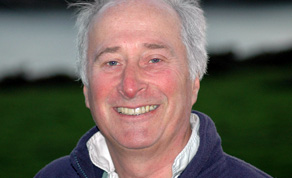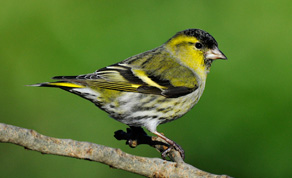Situated in Skibbereen, the Wildlife Film School runs residential and non-residential courses, workshops and masterclasses looking to cover all aspects of wildlife photography and wildlife film making in a number of countries including Ireland and the UK. IFTN spoke with the founder of the school, Nic Slocum to talk about lifestyle overhauls, worldwide whale watching and training the wildlife filmmakers of tomorrow.
Nic Slocum set up the Wildlife Film School two years ago as a result of several life-altering moves. Fed up with a daily London commute he arrived in Ireland with his wife and three young children eight years ago and started up a tourist wildlife watching business which, in turn, led to the founding of the Wildlife Film School.
“I treasure the idea of using film and photography as a way of spreading the conservation message and that’s what we’re about with the Wildlife Film School. Having started Whale Watch West Cork we decided last year to start up the school,” says Slocum. “When you look around, certainly in Ireland, there isn’t a great deal of areas or institutions where you can be trained in wildlife photography and filmmaking, the arts in general in Ireland are very well supported and there is so much creativity. But not so much in terms of wildlife.” He further explains that he didn’t like the idea of people paying enormous fees and having to go abroad for “basic training” in the area of wildlife filmmaking when there is such an abundance of subject matter at home.
Thus, West Cork now boasts a devoted Wildlife Film School which teaches digital wildlife photography, wildlife film editing alongside wildlife sound recording, camera operation and scriptwriting. The Wildlife Film School readies its students for all elements of filmmaking: “Wildlife is a fairly niche sector in Ireland and, by virtue of the size of the population, it’s also quite small,” says the school’s Director “Our mandate is to cover photography courses and filmmaking courses in all aspects of wildlife. So we look at the editing process, production, camera work, understanding equipment etc. We have courses coming up in final cut pro and we will obviously come at it from the angle of using the programme to edit wildlife films. We won’t just explain how to use the software, we will also look at shooting for the editor.”
 Nic Slocum
Nic Slocum |
“We are interested in the whole entity of the process of filmmaking,” he continues. ”And so many people don’t realise that the process of filmmaking is an incredibly intricate and complicated process that comprises of long pre-production, scriptwriting (which is of course done after production with wildlife filmmaking.) In order to become a filmmaker of any sort of quality - to become a force in wildlife filmmaking in the future - it’s the young 19, 20 or 21 year olds now who will become those cameramen, those producers and directors. “
The Wildlife Film School trains would-be David Attenborough's using Canon 70s and a Nikon D70 but lays an emphasis on training people to make the most of their own equipment: “That makes up a big part of all the courses,” Nic explains. “That and letting people know that anything is broadcast quality if it’s interesting enough.” The School’s tutors include professional photographers Phil Pound and Sheena Jolley, award winning wildlife and landscape photographer Charles Lee, ‘Lewis’ cinematographer Chris O’Dell and Prix d’Europa winning digital content creator and producer Vincent Hyland (Nestwatch). “We got extremely lucky because they are all people who live in the locality,” Nic tells us.
Looking ahead Slocum hopes to broaden the school’s horizons and those of Irish wildlife filmmaking in general through organising Ireland’s first ever dedicated Wildlife Film Festival. Nic describes why this move is his next step: “I’ve been on the steering committee of the Fastnet short film festival for the last two years,” he explains, “and I got involved with it from day one because it has a strong environmental contingent. As it happened that wasn’t as strong in the end as they thought it was going to be so we hope to get the first festival going in 2011, and it will almost certainly be held in October.”
 Siskin - © Phil Pound
Siskin - © Phil Pound |
As to the availability of photogenic flora and fauna near the school we’re told that the students are spoilt for choice: “We have a lot of wildlife habitats that we can film in the area and I’m creating and establishing good contacts with groups like the Irish Herpetology Society. We actually sponsored the competition that the Irish Herpetology Society had earlier this year which was a place on one of our courses, so we’ve made these contacts to increase our knowledge of these natural habitats to film in – newts, frogs and toads. We also have a huge choice of estuaries nearby which we use for photography.”
Courses conducted by the Wildlife Film School run at three levels. Two day courses usually run over a weekend and employ direct field experience supported by practical demonstration. These are designed specifically for those wishing to expand their understanding of digital wildlife photography or wildlife film making or those wishing to assess the industry for a potential career move. The school’s two day workshops cover topics like the use of software programmes Final Cut Pro and Photoshop during post production and are designed for those wishing to gain greater expertise to apply at the personal or professional level.
Nic and his team also organise five day masterclasses which frequently involve tours to specific locations around the world such as Baja, California – a spot Nic knows very well following years of whale watching there. These five day courses are organised with the more experienced wildlife photographer or filmmaker in mind with a view to producing publishable photographs or broadcast quality film or video through more demanding sessions.
The school has several upcoming courses: June plays host to a course entitled ‘Using Photoshop to enhance your digital wildlife, landscape or seascape images’; whilst July sees ‘Digital Wildlife Photography Field Craft. Achieving that Award Winning Image’. A Macro course in the autumn will coincide with ‘Digital Wildlife Photography – Big Whale Expedition to Canada’ in October which will entail a whale photography expedition to Québec, Canada.
“The primary locations that we’re likely to use are ones that I know Baja in California and Canada because there’s great whale activity out there,” says Nic, before adding, “that said we’re also trying to schedule a masterclass in here in West Cork for the Autumn because we really do have all the facilities and choice of wildlife we could need on our doorstep here.”
